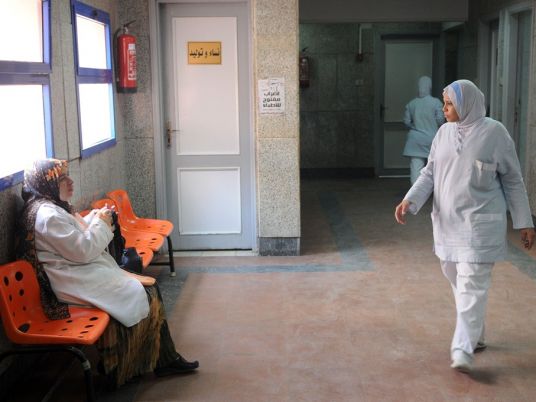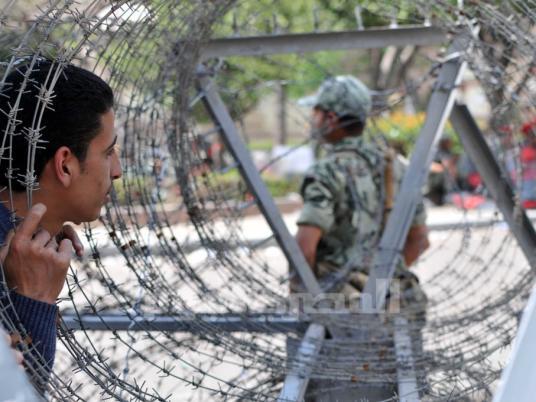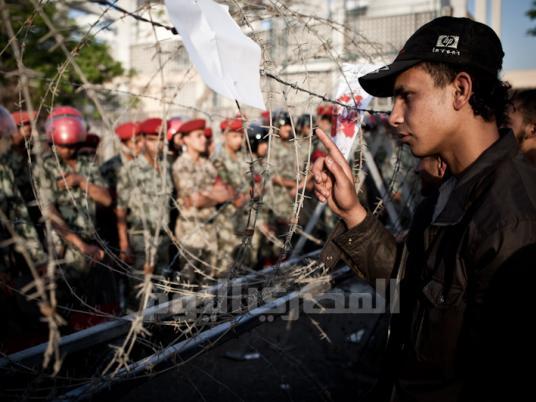About 200 mourners gathered on Friday at the Omar Makram mosque off of Tahrir Square for the absentee funeral prayer – performed when the deceased is being buried in another city – of the only martyr of the 23 July Abbasseya clashes, 23-year-old Mohamed Mohsen Ahmed.
The mosque overflowed with those who had come to pay their final respects, as well as those attending weekly Friday prayers.
Ahmed, 23, died at the Nasser Institute Hospital on Thursday, 12 days after suffering a brain hemorrhage from being hit in the head by a rock. He was a member of the Revolution Youth Coalition in Aswan.
Military police denied about 150 mourners access to Tahrir Square as they attempted to embark on a short march demanding compensation for families of the revolution's martyrs and decrying some of the tactics used by the Supreme Council of the Armed Forces (SCAF). This past week has marked the first time since 25 January that Tahrir has been completely void of demonstrations.
“He was one of us who were sitting in Tahrir Square. We have to push for justice for him and all of the other martyrs,” said Mohamed al-Sawy, who was arrested during the 9 March raid in Tahrir.
Activists told Al-Masry Al-Youm they would file charges against Major General Hassan al-Ruweiny, accusing him of incitement against protesters.
Protesters raised banners that read, "Mohamed Mohsen Ahmed is the victim of Ruweiny's incitement," "Down with the military rule, the people are the red line," and "This march is peaceful, they fooled us and said they would grant us freedom.”
Ruweiny, who is a member of the SCAF, accused the April 6 Youth Movement on 23 July of receiving funding from foreign entities and attempting to create a rift between the people the military. Some present at the rally accused Ruweiny of instigating the residents in Abbasseya by making such an inflammatory statement.
“We hold the SCAF entirely responsible for the death of Mohamed Mohsen Ahmed,” said Mohamed Moussa, a member of the National Front for Justice and Democracy, of which Ahmed was a member.
“The Abbasseya residents who attacked the march are the silent majority who are not really involved, and so were easily manipulated by the words of the SCAF,” Moussa continued.
The demonstrators refrained from mentioning Abbasseya residents, despite the fact that the rock that ultimately cost Ahmed his life came from a neighborhood rooftop, according to eyewitnesses.
Following his death on Thursday, Ahmed's family had his body transported to Aswan, so that he could be buried near his family's home.
“The people of Aswan held a huge funeral, organized by the Revolutionary Youth Coalition in Aswan, as soon as [Ahmed] and his family arrived,” said Zaynab Abu al-Magd, a professor of Middle Eastern studies at Oberlin University, who has followed Ahmed's case closely.
Magd added that during the clashes, Ahmed laid injured for two hours.
“The ambulances couldn’t reach him since we were surrounded by military police on one side and Central Security Forces on the other,” she said.
They were also afraid to send him to the nearby Demerdash hospital, due to rumors that police were arresting the injured from the protests as they entered the hospital.
Ahmed was eventually taken to the Nasser Institute Hospital, after reportedly being refused entry by other hospitals beforehand.
However, the lag from the time he received the blow to when he was treated may have made the difference between Ahmed's life and death.
“The doctors at the ministry are saying basically, 'this guy shouldn't have died.' He should've come out of it with some permanent disabilities, but not death,” said Mohamed Waked, another member of the National Front for Justice and Democracy.
Waked and others plan on submitting legal claims to the public prosecutor with regards to the treatment – or lack thereof – that Ahmed received from some hospitals.
“We have already submitted a claim against the military council's instigation of violence against protesters,” Moussa said.



